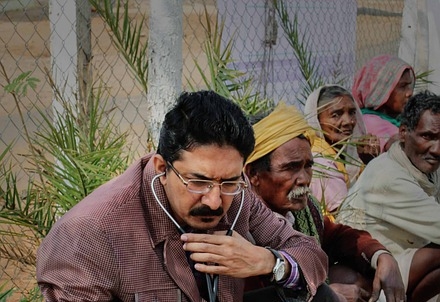American-born Israeli actress Naomi Ackerman, is the creator of an internationally acclaimed solo theatre play on domestic violence Flowers Arent Enough. 'Flowers Arent Enough' is a monologue that tells the story of Michal, a young woman from an upper middle-class family who finds herself in an abusive relationship. Naomi is an experienced actor whose whose credits include theatre, musicals, films and television. She is a professional clown, street performer and stilt walker. Besides participating in various multinational theatre productions where Arab and Jewish actors from the region worked together, she conducts film workshops promoting tolerance and dialogue, sponsored by the "Peres Center for Peace". Naomi writes directs and devises plays with children at risk from various backgrounds - using their lives and stories as the material for the show.
Ackerman is also a mediator and conflict resolution specialist, contributing as a freelance consultant to various organizations involved in adapting and creating drama techniques to deal with social, gender and educational issues. In Chennai, where she presented her show earlier this year, the Inspector General of Police watched the play on Day 1 and then sent 200 women Sub Inspector trainees for the next day's show. This was a message sent to Ranvir Shah and V.R.Devika by Dov Steinberg, the Israeli Consul General when he urged the duo behind the cultural NGO, Prakriti Foundation, to organize the show, A play about domestic violence is a hard sell, but its an important play and its merit goes well beyond its messages. Its gripping theatre, highly recommended.
Excerpts from the audience interaction with Naomi Ackerman on the darkness that is domestic violence, and some rays of light. (after the Chennai presentation)
Communication between women is a must.
Flowers Arent Enough relives the experience of a smart, educated, upper-class young woman, from a loving family, who falls in love with the wrong guy. The process by which she is forced to change is slow but definite - she is required to dress differently, not meet up with her girlfriends from school, reorient her family priorities, organize things in a particular way - all because he loves her. We really need to check out what we mean by love. As long as the men keep bringing flowers, we (the women) will do anything, a lot of foolish things, to make them happy. Everywhere - in the media, films, ads, music channels - boys meets girls, they dance for a 5 to 10 minute song, fall in love and go to paradise and live happily ever after. Chauvinism may be terrible but does not necessarily lead to domestic violence. Chauvinism is actually ridiculous. All over the world, excuses are used to find reasons for domestic violence - in Israel it could be the Palestine problem, in New Zealand its because the Maoris are a warrior class, in Australia because the men drink a lot of beer! Such justification subverts the real issue. Domestic violence doesnt start by when he wakes up one morning to beat her. It begins much before and goes on much after.
We have to stop being judgmental of victims of domestic violence.
Stop saying things like oh, she is so stupid or why did she marry him? or why did she stay with him?. Thats her life. My play ends without any specific answers. Because I dont know! Its always her choice. I could identify with every single story I have heard from many, many women on my travels. Sometimes, I couldnt believe what came out of their mouth - that these women survived to tell their story. You dont need to be beaten to be made to feel small. Even women in the so-called developed Western world feel the pressure of society telling them who to be, what to be and, most of all, whom they should be with. Culturally, traditionally, we teach our daughters the same thing. How can it all change? It is going to take a long time. Not in my lifetime anyway.
Tradition is an overpowering presence.
Flowers Arent Enough has had greater response in India than anywhere else. Once, as part of a UNIFEM project, 400 women arrived in busloads as part of a rural outreach programme in Maharashtra. Not one of them spoke English. I was nervous as hell. But it was the most moving show of the over 600 I have performed. I wept. The normal discussions last about 40-45 minutes after the performance but, on this occasion, it went on for 2½ hours. One woman told me Its not about men. Its about mothers-in-law! The role of the family is omnipresent in India. Tradition is an overpowering presence.
They (Indian women) have an incredible balance between the traditional and the modern. Change will happen but the best change happens slowly. It may be depressing but it is rooted. Indian women can take heart from that. There are more social boundaries in India than in any of the other cultures I have seen. I havent seen an American woman paving a road or hauling water. The term social worker is an oxymoron in India! Unless the community speaks up that domestic violence is not socially acceptable, women will continue to get hurt. A man in the audience once asked me if, in an arranged marriage, this sort of thing (domestic violence) wouldnt have happened. And, fortunately, the entire audience laughed! Indian women are treated as both doormats or devis - goddesses. That can be both a curse and a challenge.
I dont think more domestic violence is happening now - we just talk about it more.
Women are too good at compromise. Compromise bring peace but how much violence has to borne to bring that peace? Victims of domestic violence say for the sake of the children - but they must realize that the children will grow up following the same pattern. Women tell me we only fought after the children went to sleep so they dont know anything. From my experience in conducting workshops for children, I have found that children always know, sometimes more than adults. Women keep looking for rich, handsome men who come home and help and take care of the kids. Sorry! They dont exist. Yes, there is a profile of batterers but it cannot be pinpointed. We have all had the urge to beat up somebody over something - but we dont. That is the distinction between a person who actually resorts to violence as opposed to the average guy who controls his anger.
Women are all alike.
Women are all alike - we are ready with the best comeback 10 minutes after the conversation. We have been absolutely positive that we can take care of everything - situations, people, family, relationships - but we dont take care of ourselves. We women often use terms like he lets me or Im allowed or he gave me permission. We have to pay a price, often more than a price, to bear the consequences of our independence. Will they (the men) leave us? Will we have money? Will they take away our children? When you are in the situation, its hard to think straight.
It is the same cycle of violence all over the world. Across gender, class, race, language, geography. If you do not reach out for help, nobody can reach back to you. Silence is death. Maybe not physical but death nonetheless. I have seen it in the eyes of the CSWs (Commercial Sex Workers) with whom I have interacted via workshops. Violence can be silent. Someone ignores you, doesnt talk, doesnt communicate or hurts with words - that is violence too. If he doesnt speak the words you would like to hear, you need to say so. You dont have to shout. Just talk.
























